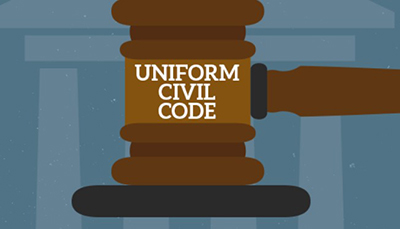Relevance: GS-1: Social empowerment, communalism, regionalism & secularism
Key Phrases: Uniform Civil Code(UCC), Article 44, Jose Paulo Coutinho judgment, Law Commission, Sarla Mudgal and Shah Bano Begum cases, Hijab Controversy, S.R. Bommai case
Why in News?
- Recently, Uttarakhand Chief Minister, Pushkar Singh Dhami announced an expert panel that would examine the possibility of applying the Uniform Civil Code(UCC) in the State.
- A BJP member in the Rajya Sabha, Rakesh Sinha, had moved a private member’s Bill for a law on the UCC.
- A similar petition for UCC implementation by BJP leader Ashwini Upadhyaya is before the Delhi High Court as well.
What is Uniform Civil Code(UCC)?
- The UCC is a single law to be made applicable to all religious communities in matters such as marriage, divorce, inheritance and adoption.
- The constitution has a provision for Uniform Civil Code in Article 44 as a Directive Principle of State Policy which states that “The State shall endeavor to secure for the citizens a uniform civil code throughout the territory of India.
What are various assertions given in the Editorial in favour of UCC implementation?
- Discrimination against women:
- The Supreme court asserted in its various judgments that personal laws governing the followers of certain faiths discriminate against women.
- Recently the Supreme Court also emphasized on a draft UCC in tune with international conventions which protect the rights of women.
- The Court Said that it is need of the modern time to shed personal laws based on “patriarchal stereotypes".
- ‘Promotes nationalistic fervour': One Nation One Law
- UCC would not only protect the vulnerable sections, including women and religious minorities, but “promote nationalistic fervour through unity” as well as simplify the complex personal laws.
- In the Jose Paulo Coutinho judgment, the apex court wondered why the nation had still not endeavoured to secure a common civil code for its citizens.
- A Bench of Justices (retired) Deepak Gupta and Justice Aniruddha Bose had said that though the “Hindu laws were codified in the year 1956, there has been no attempt to frame a Uniform Civil Code applicable to all citizens of the country”.
- The UCC activist argued that despite the Apex court judgment in the
case of Shah Bano in 1985, the government has done nothing to bring the
Uniform Civil Code.
- The Shah Bano case, which upheld a Muslim women’s right to maintenance was considered a step in the direction of implementation of the UCC.
- However, the government, in 1986, enacted the Muslim Women (Protection of Rights on Divorce) Act which nullified the Shah Bano judgment.
- Recently, the Supreme Court has even hailed Goa as a “shining
example” where “the uniform civil code is applicable to all, regardless
of religion except while protecting certain limited rights”.
- The Supreme Court’s assertion came despite the Law Commission of India, in a consultation paper released in 2018, finding the UCC “neither necessary nor desirable at this stage” in the country.
- Article 44 of the Constitution does not mandate but only asks the State to make an endeavour to secure the UCC for all citizens.
- In his Constituent Assembly speech, Dr. B.R. Ambedkar had explained that the UCC was incorporated into the Constitution as a “desirable” move, but for the moment “voluntary”.
What are various cautions given in the Editorial in opposition to UCC implementation?
- The potential fallout of UCC implementation on tribal communities:
- For instance, in Assam, the Opposition leaders said that in Assam State, tribals have their own personal laws and they wouldn’t like the government to disturb their cultural practices.
- Judicial Paradox:
- Though, recently, the top court indicated that the government should explore the UCC as a means to secure gender justice, equality and dignity of women, in its various other judgments it cautioned the government.
- In the Sarla Mudgal and Shah Bano Begum cases, the court questioned the official inactivity over a common civil code which would “help the cause of national integration”.
- However in S.R. Bommai case, has warned against “mixing politics with religion”. The court had worried whether a secular state should bring a code which can be perceived to be a threat to personal laws based on the religious beliefs of individual religions.
- The court had also questioned the wisdom of enacting a uniform law in “one go” in a pluralistic society.
- UCC can lead to 'polarisation politics' and 'communal politics' further polarises the already stressed social fabric after the Hijab Controversy.
Way Forward:
- A uniform law, though is highly desirable, enactment thereof in one go perhaps may be counter-productive to unity and integrity of the nation.
- The need for slow and gradual process, a draft model UCC law for public consultation can be a good start.
- Further, sensitization efforts are needed to reform current personal law reforms which should first be initiated by the communities themselves.
- Current institutions need to be modernized, democratized and strengthened for this change. Sincere efforts towards women empowerment have to be taken for all women of all religions.
- The plural democracy is an identity of the modern India. Therefore, efforts should be focused on harmony in plurality with gradual uniformity through consensus based UCC for vibrant Indian democracy.
Source: The Hindu
Mains Question:
Q. Discuss prospects and pitfalls in implementation of Uniform Civil Code (UCC) in a multi-culturally diverse country like India. (10 marks).






















